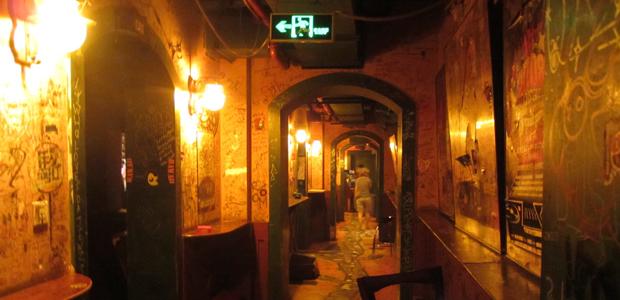Shanghai Trend Turns Bomb Shelters Into Hip Social Spaces
A bomb shelter in Shanghai turned into a bar. (Photo: Mary Kay Magistad)
Shanghai’s Peace Hotel is an art deco treasure, where elderly jazz musicians conjure the spirit of a bygone era.
In the 1930s, this is where Noel Coward polished his play “Private Lives,” where diplomats, spies, adventurers and celebrities sipped cocktails.
In August 1937, this hotel was nicked by an aerial bomb — one of four dropped by Chiang Kaishek’s airforce. They were apparently trying to take out a Japanese warship, but missed. The Japanese struck back with their own aerial bombardment, and China’s war with Japan was on.
“My grandparents were there then, and they told me everyone was terrified,” says He Li, a wiry 30-year-old knocking back vodka and orange juice at a bar in the old French Concession area, a few miles away. “People covered their heads and ran wherever they could to seek shelter. Some even jumped in the river.”
He Li’s grandparents might have liked to have the option of going where he’s drinking — an old bomb shelter, deep under ground. It’s now a popular bar called C’s, with graffiti on the walls, and a congenial buzz. C’s has been going for about 12 years, so it’s a veteran of the Shanghai trend to turn bomb shelters into hip social spaces. Others have become a wine shop, a recording studio, a men’s underwear store — even a vintage record album shop.
Open a creaking metal door, and walk down a lot of steps, and you’ll find Uptown Records, selling vintage vinyl — rock, punk, hip-hop and more. It’s run by an American named Sacco. He prefers not to give a last name, but doesn’t mind saying how he got here.
“Mostly, I just followed a girl,” he says with a smile and a shrug. “My girlfriend from San Francisco, or ex-girlfriend, moved here. And I came to visit. And I was looking for a change, and I thought, ‘well, this is nice, I should move here.'”
Now, he has a border collie named Seamus for company, who sits panting on the cool bomb shelter floor. Sacco says he got the idea for this shop when he heard about a place in southern China that imports old LPs from Japan.
“They send it there to be recycled, or as rubbish,” he says. “And I found out there are a couple of people who buy by weight up in Shanghai here. So I spent about a week down in Guangzhou, looking for the factory where they sent them, and I finally found it.”
Sacco says he gets a steady stream of customers — some, into vintage vinyl, some coming for the live gigs they have in this 3,000 square foot subterranean space, rented at a fraction of what it would go for above ground. And some visitors, are drawn by the novelty of visiting a bomb shelter. Sacco says he also gets visits from the government, to make sure this space is kept up to code:
“Every one of these shelters is actually owned by the Air Defense Bureau,” he says. “Even if you want to build a new apartment complex, you have to have a proper shelter that’s approved by the Air Defense Bureau.”
He says he doesn’t quite see the need for bomb shelters in China these days, but it’s not his call. He does allow that some people don’t seem to take the requirement too seriously.
“I have a friend in real estate, and he has one building where the designated bomb shelter is on the 20th floor, ” he says. “So it doesn’t always make sense. But you do have to have a designated area of where you go in case of an air raid.
Back on street, a woman named Zhu Fu Yi, who lives in the apartment building above the bomb shelter, scoffs when asked if she thinks she’ll ever need to use the record shop as an actual bomb shelter.
“No way,” she says. ‘Why would we need it? These days, China’s at peace.”
But back at C’s, the subterranean bar, He Li isn’t so sure.
“I don’t have any trust that peace is going to continue,” he says. “And I don’t have much trust in our diplomatic strategy. You see such a small country as the Philippines comes to China and tries to take our land, and I don’t like that at all.”
He’s talking about the Philippines’ claim to a part of the South China Sea that is much closer to their shores than to China’s, but which China still claims. Li says he likes what Mao Zedong used to say, that power comes from the barrel of a gun. His friend, Liu Chen, also 30, nods as he sips his drink. He was in the army a few years back.
“Look, it’s not good to talk about politics, but there is one thing I’d like to say,” he says. “If going to war would make China stronger, I’m for going to war. I would take up my gun again and fight.”
He knocks back the rest of his drink, and grins.
“I hope China’s leaders get my message,” he says.
